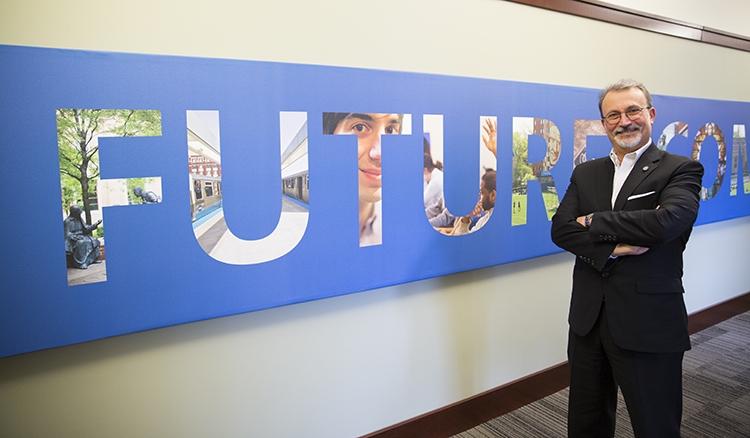 Guillermo Vásquez de Velasco, dean of the College of Liberal Arts and Social Sciences, reflects on his first year at DePaul. (Image courtesy of Enrollment Management and Marketing)
Guillermo Vásquez de Velasco, dean of the College of Liberal Arts and Social Sciences, reflects on his first year at DePaul. (Image courtesy of Enrollment Management and Marketing)
The faculty and staff in the College of Liberal Arts and Social Sciences have a running joke. In meetings, they time Dean Guillermo Vásquez de Velasco to see how long it takes before he starts drawing on the whiteboard. An architect by training, Vásquez de Velasco prides himself on using colorful graphics to illustrate ideas, and he has the walls in his office to prove it. Read on to learn how he put his architectural skills to work in his first year as dean and why hot sauce is very important.
From your very first visit on campus, DePaul made a big impression on you. Did your first year as dean meet your expectations?
It's been a very good year - very much what I expected with a few very positive surprises here and there.
In our institutions, we have two sides - the professional and the personal, more emotional side. When I first visited, I knew more about the professional side - all of DePaul's credentials and history. I still remember when I came for my interview. People often go around the table to introduce themselves, but in this case, everyone mentioned why they came to DePaul and why they are still here. By the time we finished going around the table, I was sold on DePaul.
Beyond the professional side, I could see that human, personal side and the connection to the mission. It was real. That was a great surprise. I felt at home just weeks into my tenure because of that connection to the mission. It's a common denominator at DePaul.
When you describe the liberal arts, you refer to T-shaped people. What does that mean?
T-shaped people know something about everything and everything about something. That duality makes them strong professionals. They know their field, but because they are also trained in core skills that cross over disciplinary boundaries, they collaborate easily and naturally with others. They are highly empathic. When they talk with different people, they can easily get in their shoes and evaluate other perspectives. They understand their audiences well. In my opinion, they are the best leaders, because they are doers, but doers with a strong moral compass. That's the value of a strong DePaul liberal arts education.
Last fall, LAS faculty, staff and administrators participated in a day and half retreat. Alumni and students got involved too. What came out of the retreat?
We started with a draft of the liberal arts vision that I brought when I came for my interview. Then we took it to the next level by developing a new narrative to describe the liberal arts and social sciences at DePaul - a new understanding of our role in the university as a core college. From the beginning to the end of the retreat, it was all about how we bring the mission to life. The mission is at the core of what we do, and it's a commitment that faculty and staff take very seriously.
We're now working on a new design for the college that responds to that narrative. Collaboration is a core element, and leadership for the common good a central goal of our curriculum. Our faculty are currently kicking the tires of the redesign, and we should be ready to share more details soon.
Multi-disciplinary learning is important to you. How does it fit in with this new narrative?
Here's how I explained it recently. (Keep in mind that I like eating, and I like metaphors.)
We talk about, and easily recognize, traditional cuisines - Italian, Chinese, and others. In the College of Liberal Arts and Social Sciences, we have many traditional departments.
More recently, however, creative chefs have pioneered fusion cuisine - for example, my favorite, Korean tacos. Fusion cuisines are not limited to a regional palette of ingredients, and when you put all of those ingredients together, the result is delicious. In LAS, we have our own kind of fusion too - our multidisciplinary departments, built from ingredients in our many departments, programs and centers. You'll recognize them because of their names - in most cases they include "studies" - and are not restricted to a single discipline.
Our traditional departments and our "fusion" programs allow us to meet the needs of a broad spectrum of students with a wide range of tastes and interests. LAS constantly experiments in dialogue with the challenges of our complex world and the opportunities that our Vincentian mission helps us identify. To return to our food metaphor, we are the hot sauce for the entire university. If you have a taste for hot, you can put it on anything. If you have a taste for our mission, you can add LAS to any degree, any field, any career and make it richer.
That's our secret recipe.